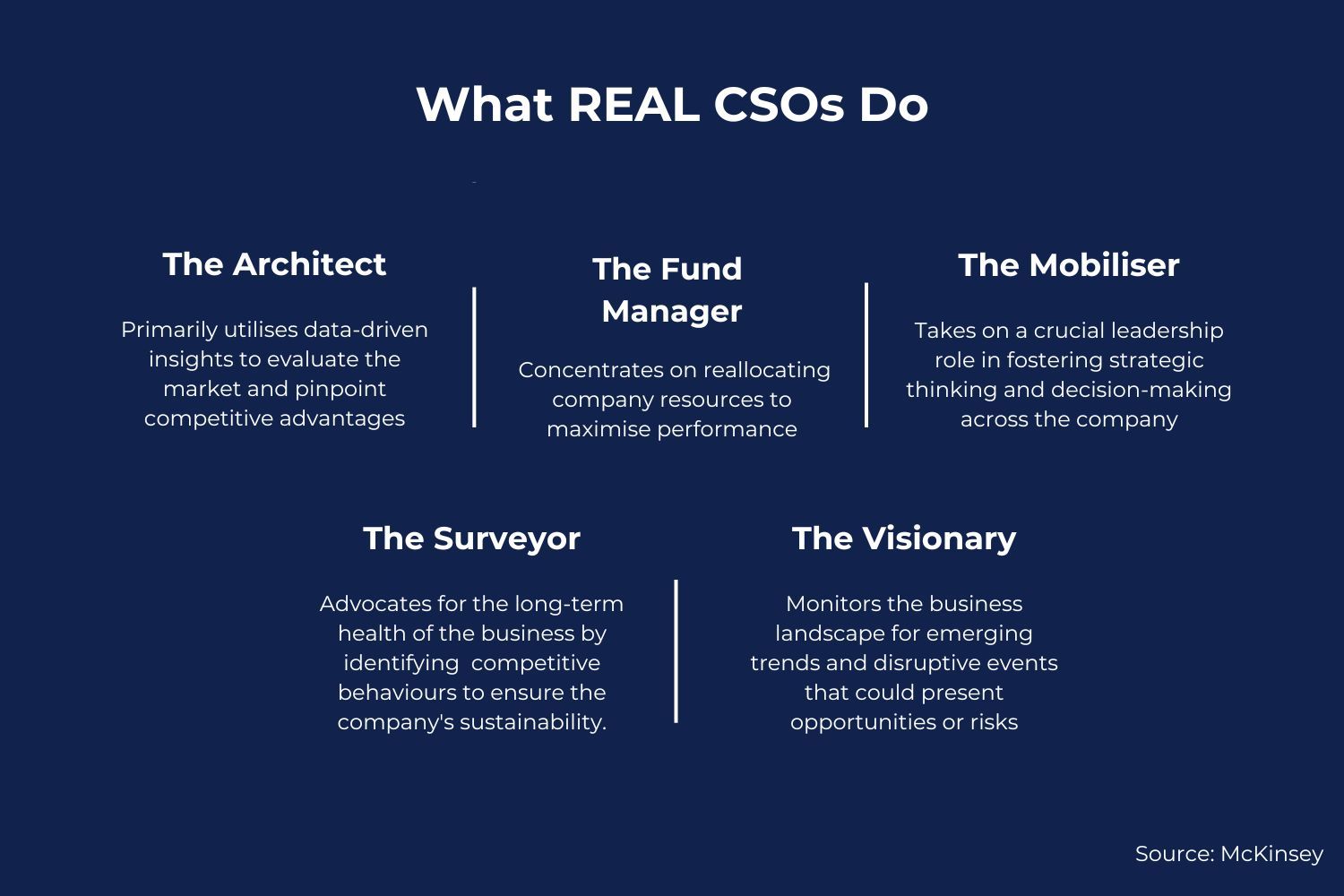Leadership Insights
The CSO: A Key Player in Driving Innovation, Growth, and Sustainability

The era of 'set it and forget it' strategy is decidedly behind us. In its place, a new paradigm has emerged: one that demands leaders adopt a dynamic, iterative, and relentlessly adaptive approach to strategy development and execution. This shift has thrust the Chief Strategy Officer (CSO) into a critical role, ensuring alignment with the company's strategic vision amidst technological innovation, shifting consumer dynamics, economic uncertainty, and disruptive market forces.
As organisations strive to stay ahead of the curve, they have increasingly formalised strategy as a dedicated function, elevating it to the C-suite and entrusting it to the CSO's expertise. In this new reality, the CSO's ability to navigate complexity, foster collaboration, and drive strategic alignment has become a key differentiator in driving business success.
A 2023 Deloitte study underscores this trend, showing a 12% increase in organisations prioritising strategic alignment, with 74% now making it a core focus.
The strategy function is undergoing a significant transformation within organisations, with a marked expansion in dedicated strategy personnel. A notable 35% of companies now boast more than ten strategy experts, representing a 6% uptick from 2021. This surge underscores a profound recognition of strategic planning and execution critical to business success.
This seismic shift heralds a new era for the Chief Strategy Officer (CSO), whose role has transcended traditional advisory boundaries to become a catalyst for business transformation and long-term growth. The CSO now sits at the nexus of innovation, disruption, and strategic alignment, driving the organisation's ability to adapt, evolve, and thrive in an ever-changing landscape.
Historical Context Vs. Modern Responsibilities in the VUCA Landscape:
The Chief Strategy Officer (CSO) role has undergone a profound metamorphosis in recent years, mirroring the escalating complexity and dynamism of the contemporary business environment. Historically, strategic planning was a tightly controlled domain, guarded by the CEO and a select coterie of senior leaders.
However, as organisations struggle to navigate the turbulent waters of today's fast-paced landscape, the imperative for a dedicated, specialised strategic function has become unmistakable. The CSO role has emerged as vital, bridging the gap between strategic vision and operational reality and ensuring that organisations remain adaptable, resilient, and future-proof.
79% of strategy leaders surveyed by McKinsey anticipated altering their job functions and mandates within the next two years due to the evolving business environment.
The modern CSO must also excel in strategic execution, ensuring that plans are translated into tangible results. This demands a unique blend of strategic foresight, operational expertise, and collaborative leadership as the CSO works closely with cross-functional teams to drive progress, mitigate risks, and capitalise on new opportunities.
Moreover, the CSO needs to foster a culture of strategic agility, empowering the organisation to pivot quickly in response to shifting market conditions, regulatory changes, or unexpected setbacks. This requires a high degree of emotional intelligence, influencing skills, and communication savvy, and, equally, a CSO must inspire, motivate, and align stakeholders across the organisation.
In essence, today's CSO is a strategic orchestrator, harmonising the diverse elements of the organisation to create a cohesive, adaptive, and high-performing entity that can thrive in even the most turbulent environments.
Bridging Strategy with Execution: No longer Confined to the C-suite
As the strategist's role continues to evolve, they are increasingly expected to be catalysts for innovation, disruptors of the status quo, and champions of cultural transformation.
Even more so, strategists are adept at navigating the nuances of power dynamics, influencing without authority, and building coalitions that drive collective impact. No doubt, they are the architects of strategic alignment, ensuring that the organisation's purpose, priorities, and resources are harmonised to achieve sustainable growth and societal impact.
The role of the strategist has become synonymous with value creation, organisational resilience, and leadership excellence.

Today's strategists are deeply embedded in the organisation's fabric, forging vital connections and aligning diverse teams towards a shared vision of success. Through collaborative leadership, they gain a comprehensive understanding of the organisation's capabilities, challenges, and opportunities. This informed perspective enables them to craft innovative, adaptable strategies that drive internal transformation and position the enterprise for sustainable growth.
Beyond the organisation's boundaries, CSOs play a crucial role in every aspect of shaping their company's engagement within the broader business ecosystem. By defining their organisation's position and involvement in these dynamic networks, CSOs steer the formation of strategic partnerships and fuel innovation and adaptability. This multifaceted role sees the CSO serving as both an internal architect and external navigator, underscoring the criticality of this role in driving holistic organisational success.
A most successful CSO is a vital link in both internal and external spheres, harmonising disparate elements to create a cohesive, resilient, and high-performing entity that thrives in a rapidly evolving market landscape. Their ability to balance strategic foresight, collaborative leadership, and ecosystem navigation makes them an indispensable asset to organisations seeking to stay ahead of the curve.
The New Enhanced Role of CSOs:
Today's CSOs are strategic virtuosos, orchestrating the organisation's response to disruption and uncertainty. They're no longer mere risk managers but opportunity catalysts, leveraging their unique vantage points to identify and capitalise on emerging trends and innovations.
Their influence extends far beyond the C-suite, as they inspire and mobilise the entire organisation to embrace change and thrive in uncertainty. With their finger on the pulse of the market and their eyes on the horizon, CSOs are the architects of resilience, the masters of reinvention, and the champions of sustainable growth.

Reach out to one of our specialist consultants or connect with us at contact@selionglobal.com and explore how we can help you in talent advisory and leadership development today and in the future.